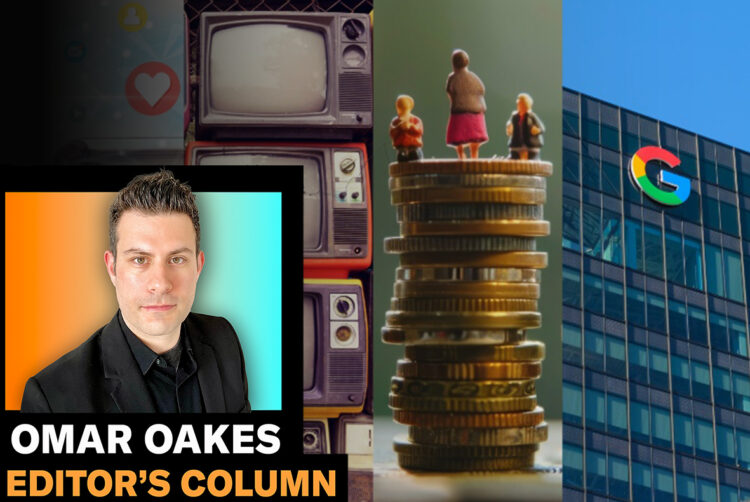2024 in review: A year of disruption, inclusion, courage and excellence

100% Media 0% Nonsense
For my last column as editor-in-chief, I’d like to sign off with a celebration of those that best demonstrated The Media Leader‘s values of disruption, inclusion, courage and excellence this year.
Disruption. Inclusion. Courage. Excellence.
These four words — which spell the word “DICE” — are the values that The Media Leader aims to champion through our journalism and coverage of the media and advertising industry. Publicly committing to these values was one of the first things I did as editor in 2021 (before our rebrand from Mediatel News to The Media Leader the following year).
The decision to rebrand as The Media Leader came from putting “leadership” front and centre. That ineffable and inconsistent quality that we expect from decision-makers is endlessly fascinating as well as being critical to a business’ success.
So The Media Leader‘s mission became about leading our audience to what our journalists felt was important based on our experience, knowledge and contacts, not blindly following whatever rival publications were doing or what press releases landed in our inbox.
“DICE” is effectively our roadmap.
We provide daily analysis and commentary through the lens of how disruptive, inclusive, courageous or excellent something is. Our only awards scheme, The Media Leader Awards, has the DICE values front and centre in its entry criteria, as does our Future 100 initiative to build a collaborative network for the industry’s next generation of leaders.
So, for my last column as editor-in-chief of The Media Leader, I’d like to sign off with a celebration of those people and companies that demonstrated these values best of all this year.
Disruption: US vs Google
Google was handed the motherlode of Christmas gifts in 2007 when the US Federal Trade Commission decided to wave through its $3.1bn purchase of online ads rival DoubleClick.
“After carefully reviewing the evidence, we have concluded that [the deal] is unlikely to substantially lessen competition,” the FTC said with a statement that has aged more badly than a Gregg Wallace Instagram post.
That acquisition paved the way for yet more consolidation in a nascent adtech market, whose fundamental weakness would be masked for the next decade as interest rates in the US and Europe fell to rock-bottom levels and encouraged a boom in internet startups that calculated they could become the next DoubleClick and get bought by Google, Microsoft or Apple.
Now that the era of cheap money is over and rates are back at “normal” levels, Google controls more than 90% of the search market. Not only has it benefited from market forces that tend to create a search monopoly, it has also become so powerful that it can block competitors through deals with Apple, the US justice department’s prosecution has alleged.
So it was long past due for the US government to take action against Google and disrupt this seemingly inevitable march towards complete market domination of online display, online classifieds and, via YouTube, online video ads.
Highly Commended: Who Cares?
The Media Leader columnist Nick Manning and co-conspirator Brian Jacobs got so fed up with people moaning about the state of advertising that they challenged the industry to show how much it really cares.
In September, the Who Cares? conference attracted leading names from across the spectrum of agency founders, brand marketing royalty and media experts — all of whom were given a remit to be honest about why advertising is in disarray and what we need to do about it.
It’s a movement that began with this conference but should live on in exciting and innovative future guises — and I can’t wait to see what happens next.
Inclusion: OMD and the7stars get real about ‘class’
Most trade publications ignore the media research community, possibly because these people produce thought-provoking papers instead of PR-generated press releases that can be easily copied and pasted into “news articles”.
Our search for media excellence means we are constantly talking to the industry’s best media strategists and insight professionals, who are making the industry smarter about how audiences are changing and how best to reach them.
Take one example. It almost goes without saying that most advertisers want to reach ABC1 (the most affluent) consumers.
But work this year by Omnicom’s OMD was a big win for inclusiveness — namely its research into what “class” in the UK means now and how advertisers and media owners need to rethink content and targeting strategies.
The Farce of Class won best paper at the recent Media Research Group conference after laying bare the biases that go into defining a person’s class in the UK. It shows the grades are far less relevant than when they were created in the 1950s because they do not recognise people’s buying power.
Moreover, the7stars and Kantar Media have also built on this work. At the same conference, they presented Is socioeconomic grade getting in the way of good decisions? Why brands might be missing a trick…
Their work has also spawned a project called reCLASSified, in which the agencies, the IPA and Kantar can help the industry better recognise class nuance and works on evolving social economic grades as a cross-industry group.
Highly Commended: Thinkbox and Barb expand membership
Former Thinkbox boss Tess Alps gave the world the quote “TV is not dead, it’s having fucking babies”, but this was the year that the UK TV industry really demonstrated that.
Thinkbox welcomed a cavalcade of streamers to its organisation, while Barb brought on Amazon Prime Video and TikTok after having secured Netflix and Disney in recent years. YouTube has also quietly come back after resolving a previous dispute.
TV is obviously not dead and consumers ultimately don’t care whether they watch it through an aerial, a cable or on crappy internet signal while they’re on the bus. What consumers do care about is quality programming and prices they can afford — and it’s important that UK TV incumbents work with, not against, the US broadcasters and Netflix to make connected TV as powerful as analogue TV was last century.
Amazon, Disney+, Netflix, Vevo and Warner Bros Discovery join Thinkbox
Courage: EssenceMediacom tells truth to power
Part of the mystery of Elon Musk’s ruination of Twitter is why anyone should care from an advertising standpoint.
Even before Musk began using X as a political influence plaything, it was dogged by brand-safety concerns and had struggled to increase its ad revenue relative to the colossus of Facebook/Instagram and more innovative smaller players like Snapchat and TikTok.
One suspects too many brands spent the 2010s investing in social media teams that create a lot of work with questionable ROI. There are only so many inane posts to put out each day, so it makes sense that you would put more money into social media advertising, given that you’re already paying people to make the creative.
So how refreshing to see EssenceMediacom, led by co-chief strategy officer Richard Kirk, calculate that advertisers may be spending three times as much as they should on social relative to other media channels. You simply don’t hear agencies make this argument enough, but that is what advertisers should be paying them to do.
Brands could be spending three times too much on social. You read that right
Excellence: Shining a light on how TV lifts brand outcomes
The argument that marketing expenditure should be seen as a company’s capital investment (as opposed to a normal cost of business) has rightly gained traction in recent years.
Great marketing, which may include award-winning advertising as well as smart media planning, is like giving your product or service a first-class education. It can bring huge benefits years into the future, such as enabling you to charge higher prices in exchange for brand loyalty.
Podcast: Independence is vital for trust in media — Dr Grace Kite interview
I was amazed to learn from effectiveness expert Dr Grace Kite this year that so many leading brands are led by people who apparently did not get this until recently.
That means media owners need to work harder than ever to draw pictures and use diagrams to show how advertising has a direct impact on key business outcomes, such as website visit, search engine queries and units sold.
So ITV, Sky and Channel 4 announced the launch of a joint measurement panel in September aimed at tracking the short-term impact of TV advertising on sales in a move they say will give the sector “the measurement it deserves”.
For now, I will sign off with a big thank you to all those who supported The Media Leader and my tenure as editor-in-chief. Thank you.
See you in the new year, when more exciting developments lie ahead for this industry and I look forward to seeing how they champion — or not! — The Media Leader‘s DICE agenda.

Omar Oakes is UK editor-in-chief of The Media Leader and was nominated for B2B Columnist of the Year 2024 by the British Society of Magazine Editors. 100% Media 0% Nonsense is a weekly column about the state of media and advertising.



